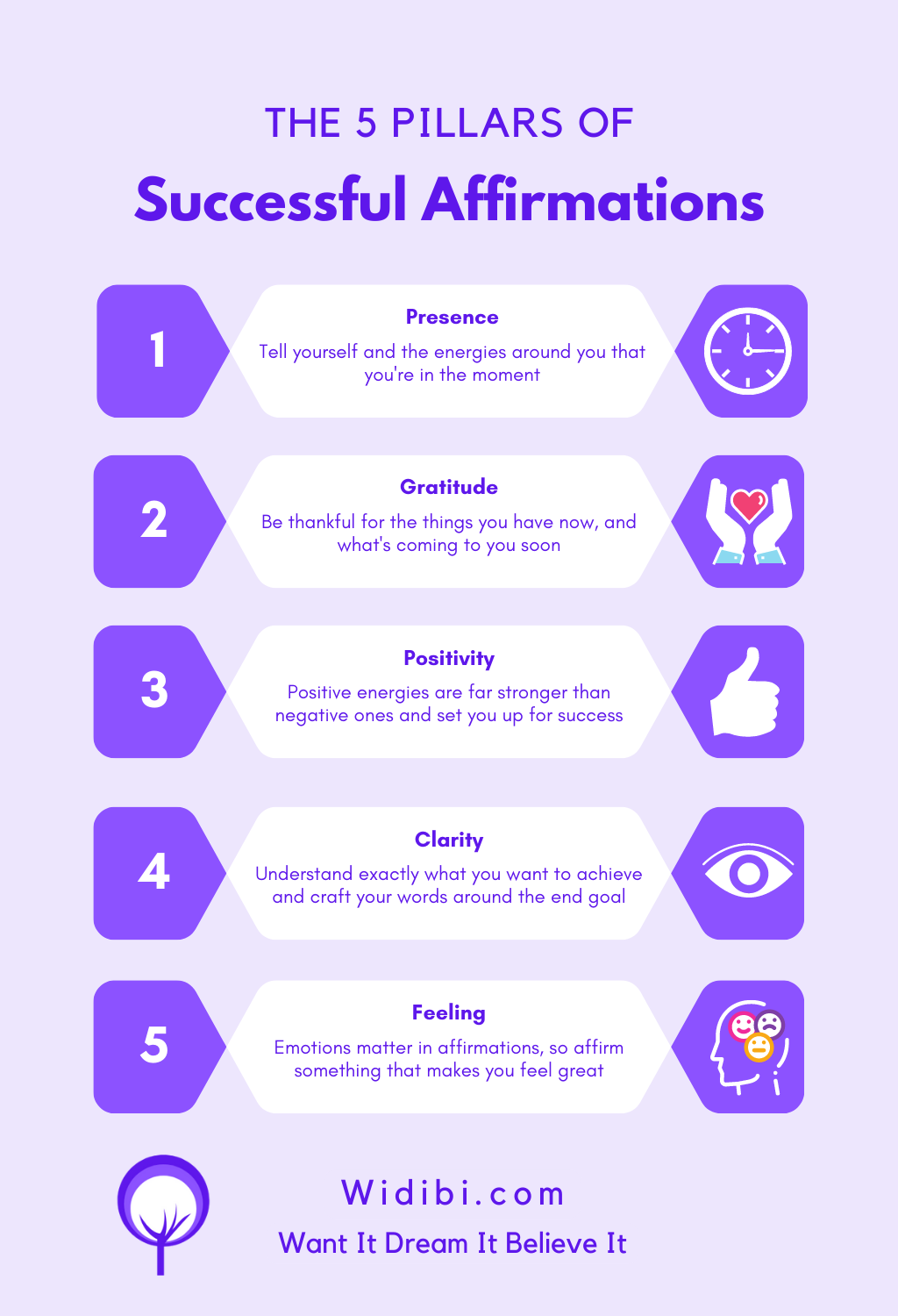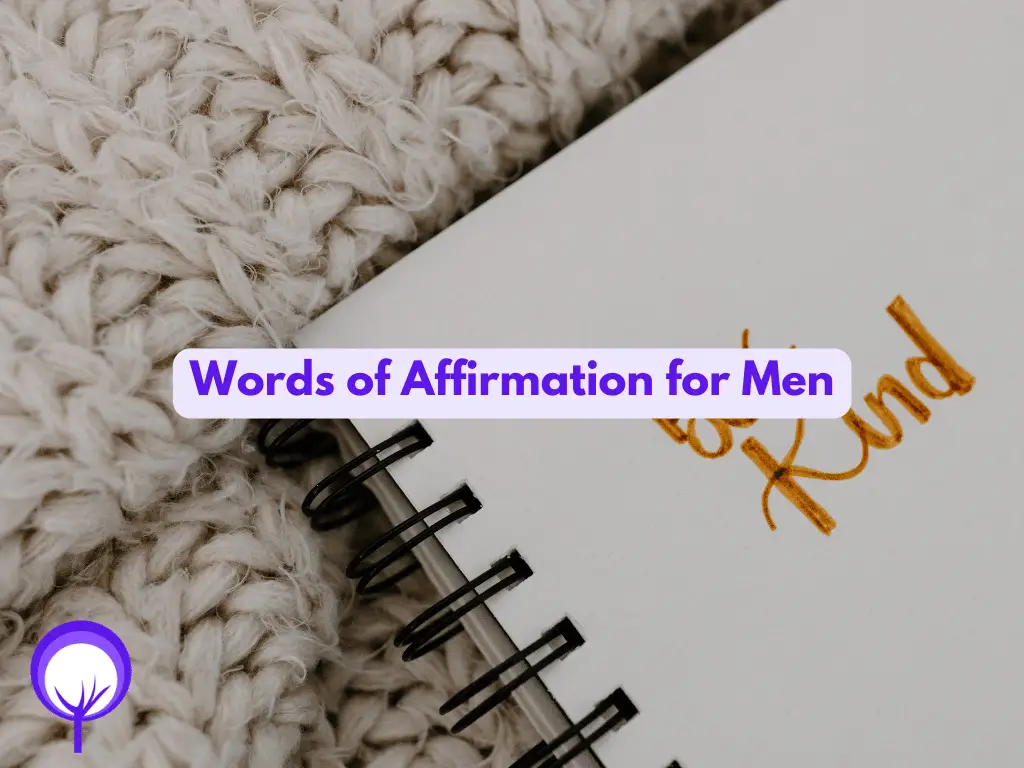I’m a big fan of getting the basics right, and if you’re new to affirmations, you really shouldn’t overlook perhaps the most important element of all – the words! An affirmation is a short sentence that includes a positive sentiment and usually a word of gratitude too. Affirmations for you as an individual typically start with “I”, although it is possible for couples and even groups to make these positive statements, typically starting them with “we”.
While not everyone uses affirmations, some consider them an essential part of human communication, or at least something that anyone with any literacy skills can do. They can be written, spoken, or even just thought because words of affirmation are a tool that will enable you to achieve a result. That could be setting you up for the day ahead, getting you in the right frame of mind for something specific that’s coming up soon, or as a way to make your manifestations happen.
They are simple phrases, which is part of what makes them so accessible. However, they are inherently very powerful. Like most things of this nature, it is difficult to “prove” they work. However, just as with the Law of Attraction, it’s one of those things that I believe that everyone should try at least once, just to see the results for themselves. The best part is that you don’t need to set aside weeks or months for experimentation.
In This Article
What Are Words of Affirmation?
Words of affirmation are positive messages condensed down into simple sentences. They’re typically expressions of love, support, encouragement, or gratitude. While simplistic, phrases like “I’m proud of you” and “I love you” are all examples of affirmations. Indeed, they shouldn’t be underestimated in the context of love, which I’ll come on to later in this article. Gary Chapman has sold over 20 million copies of The 5 Love Languages: The Secret to Love that Lasts to date. One of those love languages? Words of affirmation!
One of the best things about using words of affirmation on a personal level is that you don’t have to wait for someone else to say them to you. The two examples above are often associated with someone else saying them to you. Of course, there’s nothing at all wrong with saying “I love you” to yourself – it’s a valid affirmation strategy but one that might attract some strange looks if you do it in public!
Indeed, the sheer strength of affirmations stems from the fact that you’re in control. In my article on the most powerful word of affirmation, I was clear from the outset that “I” is the one to look out for. If you can take care of yourself first, then everything involving others will fall into place much more easily.
The reasoning behind affirmations and their popularity stems from their psychological benefits. I’m a big believer in positivity. If you can approach everything with an open mind and make a point of saying “yes” more than you say “no” then you’re likely to have a far better day, every day. In expressing affirmations, you’re making a commitment to yourself and, depending on your beliefs, the universe, that what you’re saying is true. You’re far more likely to work towards that being the case when you’ve made a commitment, as you wouldn’t want to be a liar!
Getting Started With Words of Affirmation
If you’re brand new to words of affirmation, here’s an example to get you started:
I will achieve everything I set out to do today.
It’s a commitment of sorts, but not a significant one. No matter when you read it, it will work as long as there’s still something left to do today. And if you’re reading this in bed last thing at night, come back first thing tomorrow or leave this page on your phone overnight and say it before you start anything new.
Then, make a point of coming back to review it. You said you’d achieve everything on your (hypothetical or real) to-do list. Did you? If not, then at least you tried. I’d encourage you to try again, but you’re under no obligation! If you did, congratulations!
Is it indisputable proof that affirmations work? Not quite. But it did work, so try it again tomorrow.
No matter the result, think about how it made you feel. Did you remember that you’d made that affirmation at any point? Did you look at a task and consider leaving it until tomorrow, then remember that you’d made a commitment to getting it done? That’s exactly the kind of psychology I’m talking about and precisely why words of affirmation are so powerful.
If you’d like to go into more depth on affirmations and want to commit to doing them regularly, take a look at my article on how to start daily affirmations.
How To Use Words of Affirmation
Affirmations are not complex, and there are no hard and fast rules. One of the main reasons why I’d encourage you to keep trying even if they don’t yield the expected results the first time is that it can take some practice, and you need to find a way that works for you. Your skills will also evolve over time. You might start by writing and then saying affirmations out loud. That’s what I did. Over time, I got used to the fact that during every waking hour, I’d made at least one commitment to myself through affirmations and all I needed to do was express them in my mind.

After a few weeks of getting started with the practice, I no longer needed to write or say anything. I’d start the day by thinking about what the next few hours had in store (making sure I updated the to-do list the night before really helped with that) and would craft the morning affirmations I needed and express them in my mind. That was my commitment to myself and the universe, and it ensured that I was accountable throughout the day and that the universal energies, if they’re there, were there to support me throughout.
I sometimes return to other techniques. If something particularly important happens on a given day, or I’ve broken my affirmations streak and need to get back on track, there’s no harm in getting back to basics. Fortunately, those basics are fantastic for anyone just getting started.
If you’re new to the concept of affirmations, take a look at these articles for some ideas on how to get up and running:
- Using Artificial Intelligence to Craft Your Affirmations
- What’s the Purpose of Affirmations?
- The Rotating Affirmation List (This is my favorite, partly because I came up with it!)
Remember, you don’t need to do anything fancy. You can just as easily write down any statement, say it out loud, and consider the job done. There are also plenty of resources out there for you if you’re unsure about what you want to affirm to start off. There’s my very own list of affirmations for friendship and a whole world of affirmation content on YouTube, such as this video:
Daily Words of Affirmation for Her and for Him
While I’m not entirely sure about the differences, mainly because I’ve never really thought about it, many people perceive that affirmations differ depending on gender. There are certainly no strict rules on this – I’d be more inclined to ensure that the affirmations chosen are relevant and realistic than adapting them based on who I am. Nevertheless, it’s a topic of interest and one I certainly won’t shy away from.
What is relevant is how these affirmations are received. Again, I consider affirmations to be a personal activity first and foremost, as I like to be in control of what I affirm, both in deciding what is relevant at any given time and ensuring it happens.
However, that doesn’t mean I completely ignore that affirmations are relevant to others. When you’re not talking to yourself, affirmations can be a great way to:
- Make people feel better about themselves
- Create a stronger bond between you and them
- Give them confidence and reassurance when they are anxious and uncertain
Time asserts that being in love is good for your mental and physical health. Someone saying “I love you” can reinforce that. More importantly, it can happen exactly when needed for a timely boost.
So, while personal affirmations don’t rely on gender, it can be worth considering the other person when deciding what to say to them.
Words of Affirmation for Women
According to some practitioners, women might value words of affirmation that highlight their emotional intelligence, nurturing nature, and inner strength. Furthermore, recognizing their empathy, patience, or perseverance can significantly impact their lives and their success with affirmations in general.

Here are some examples of words of affirmation for a female in your life that can be used to encourage them and boost their mood when you believe it might help:
- “You have such a kind and compassionate heart, and it positively impacts everyone around you.”
- “I admire your strength and resilience in the face of challenges. You inspire me to be better.”
- “Your intelligence and creativity never cease to amaze me. You have a unique way of solving problems and thinking outside the box.”
- “You are truly beautiful, both inside and out. Your warmth and grace brighten every room you enter.”
- “I appreciate your unwavering support and understanding. You’re a wonderful friend/partner/sister/mother.”
- “Your hard work and dedication are truly inspiring. You’re capable of achieving anything you set your mind to.”
- “You have a fantastic sense of humor and contagious laughter. You always know how to lighten the mood and bring joy to others.”
- “Your empathy and ability to listen are some of your most incredible qualities. You make people feel seen and heard.”
- “I’m grateful to have you in my life. You’ve made a lasting, positive impact on me.”
- “You have an incredible talent for [something they’re good at or anxious about], and it’s amazing to see you excel at something you’re so passionate about.”
Words of Affirmation for Men
Men are more likely to resonate with words of affirmation that focus on their achievements and abilities. Allegedly, women have a harder time accepting compliments than men do, so don’t be afraid to add some gushing praise to words of affirmation for your husband or any other male figure that could do with a boost.
I do have a bit of personal experience here. I agree with the assertion that affirmations that touch on subjects that a man might not normally receive praise for can be particularly powerful. Focus on roles rather than personal characteristics – tell them they’re doing a fantastic job as a father, husband, friend, or colleague, and you’re likely to have the kind of impact on their day you’d like.

Again, here are some affirmation examples for men based on those concepts:
- “Your strength and determination in facing challenges are truly inspiring. You motivate me to keep pushing forward.”
- “You’re an amazing friend/partner/brother/father, and your support and love mean the world to me.”
- “Your intelligence and problem-solving skills are remarkable. I always learn something new from you.”
- “You have a great sense of humor, and your ability to make others laugh brings joy to everyone around you.”
- “Your hard work and dedication never go unnoticed. You set an excellent example for others to follow.”
- “You’re a great listener; your empathy makes others feel valued and understood.”
- “Your creativity and passion for [specific skill or hobby] are impressive. It’s incredible to see you excel in something you love.”
- “Your kindness and generosity significantly impact the lives of those around you.”
- “I appreciate your honesty and integrity. You’re a trustworthy and reliable person.”
- “Your confidence and positive attitude are infectious. You inspire others to believe in themselves and their abilities.”
Examples of affirmations for men and women are great, but they’re a starting point. I don’t know the person you want to express these affirmations to as well as you do (and probably not at all!), so I’d encourage you to take these examples and to take them and customize them into something that is both relevant and true.
While I’m less inclined to differ between men and women when it comes to affirmations than others, I do know that if you don’t believe what you’re saying is true, then there’s absolutely no point affirming.
How to Ask Your Partner for Words of Affirmation
I’m just guessing, but I’d assume that fewer than 50% of people worldwide use affirmations. As such, it’s statistically likely that in a relationship where one person has them in their toolkit, there will be a partner that doesn’t. So how do you go about asking your partner to give you words of affirmation? You could get them to read that Gary Chapman book I linked above, but I could also narrow it down so you can start immediately (and you could get them to read this article – the share buttons are at the bottom).
Choose the Right Time and Place
If you want to encourage your partner to give you words of affirmation, try to find a setting that’s quiet, you’re both comfortable, and there’s a minimal chance of any distractions. If you’ve got kids, wait until they’ve gone to bed. Turn the TV off. Ensure you’ve got their full attention and try to avoid times when either of you is likely to be stressed or otherwise unreceptive.
Be Honest and Assertive
Ideally, you’ll have thought about how to approach the subject before the time comes. Make sure you know how to explain what words of affirmation are, why you want to start using them, and what you hope to achieve. I’m the first to admit that people are naturally predisposed to think of affirmations as some kind of pseudoscience, and some may be less receptive than others.
Explain why you think they’re worth a shot and what you want to achieve. Try to come prepared with some affirmations of your own, even if they’re taken from the examples outlined above. If you can explain what they mean to you and how to use them, most loving partners will be receptive.
Take Feedback Seriously
Two-way conversation is a cornerstone of relationships, and you’re far more likely to succeed if you’re receptive to comments and concerns from your partner. You might hit the jackpot and find they’ve been using daily affirmations for ages but were too shy to share. Alternatively, they might push back and need some convincing. Try to answer their questions and concerns. In my experience, it doesn’t take much to convince them to at least give it a try.
If you’re reading this article, you’re passionate about affirmations and the impact they can have on your life. Your partner might be starting from scratch, and you need to be prepared for this. If you’re patient and nurturing, you can embark on a journey together that will make a massive difference to both of your lives. It might not happen all at once, and it’s vital not to overwhelm them – big challenges are far less likely to be overcome than those that are broken down into smaller parts.
And, hopefully, that’s all there is to it! You can use words of affirmation on yourself and on your partner, and even on other people without them noticing, all in the spirit of helping them to become the best people they possibly can be!










